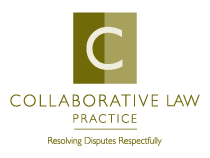Collaborative Practice
Collaborative Practice is a way for clients to settle legal disputes without ever going to court, but with each party having his or her own lawyer.
Collaborative Practice is a good choice for couples who want the help of lawyers, but only if those lawyers are committed to staying out of court and proceeding in a respectful and cooperative manner.
Collaborative Participation Agreement The collaborative process is established when the parties and their collaborative lawyers sign a contract to collaborate, commonly known as a "Collaborative Participation Agreement". The Collaborative Participation Agreement states that the parties are committed to resolving their legal issues out of court, and that their collaborative attorneys are prohibited from representing either party against the other in any contested court proceeding, now or in the future.
How It Works During the collaborative process, the parties and their collaborative attorneys work towards a written, binding settlement agreement through a series of group meetings. All relevant information is voluntarily shared. The collaborative attorneys encourage open and respectful communication, with the goal of reaching a mutually acceptable settlement which acknowledges the highest priorities of each party.
Children's Issues Many couples who have children find it helpful to work with a child specialist as part of the process. The child specialist is a neutral consultant who can provide guidance about what might work best for a particular family. In addition to having the input of a professional with experience in family dynamics, using a child specialist as part of the collaborative process can save time and money by reducing the length of meetings and/or the number of meetings clients might otherwise need with the attorneys.
Financial Advice Neutral financial consultants can also be used in Collaborative Practice to provide advice on matters such as income tax questions, retirement planning, debt management, investing options, and assessing the value of certain assets, such as a house, business, or pension benefit.
Legally Binding Agreement Once the parties have reached consensus about their financial and parenting arrangements, the collaborative attorneys draw up a binding contract for both parties to sign. That contract can then be turned into a court order or divorce judgment by the collaborative attorneys, if the parties both desire to take that step.
For more information about Collaborative Practice, link to:
International Academy of Collaborative Professionals
Ithaca Area Collaborative Law Professionals
The information that you obtain at this web site is not, nor is it intended to be, legal advice. You should consult an attorney for individual advice regarding your own situation. Nothing on this website is intended to create an attorney-client relationship. Neither your use of information contained on this website nor your communication with Erin E. McKinley create an attorney-client relationship between you and Erin E. McKinley.
Copyright © 2025 Erin E. McKinley.

